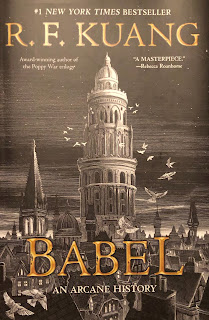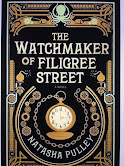Historic Magic: R.F. Kuang's Babel
Book Review by Theresa Gauthier
There are books you know you’ll read as soon as you hear about them. Babel by R.F. Kuang was that for me. A long, complex story of a world nearly our own, yet with a major, magical difference—so subtle, so minute a detail, yet with such long-reaching, inventive applications that it makes more sense to me than our real magic-less world—though not in a good way.An alternate reality 1830s England—the British Empire is fueled by magic manifested in silver bars. This isn’t your run of the mill magic. This is silver bars combined with language in what they call Match Pairs—as the magic the bars make lies somewhere between the two words. It’s translation magic. The magic happens in between the meanings. Two words that mean close to the same thing in two different languages are paired on the silver bars, but it’s in the “not quite” that the magic happens. Translation is never word for word literal. All of this makes people who study languages the most in demand of the world. Native speakers of languages are useful and therefore enticed, tricked, trapped into attending Oxford ostensibly to learn to use their language skills to create these magical bars and research more potential uses, but in reality these people are expected to abandon their homelands for the glory of the Empire.
This book touches on everything. Racism. Elitism. Capitalism. Colonialism. Sexism. Just what are the responsibilities of people who find themselves participating in something that’s beneficial on a personal level, and yet detrimental on a broader level?
The story follows Robin Swift, an orphan from Canton who is moved to England by Professor Richard Lovell in the hopes that one day he’ll attend Oxford. Chinese is a language of importance and interest to Oxford’s language department. Relying on native speakers means making sure the students who study don’t forget their language. Robin is surprised to be studying Cantonese as well as the other languages but is even more surprised when he realizes he’s losing some of the language. He throws himself into the lessons then determined not to lose the language.
His eventual acceptance into Oxford is a forgone conclusion, but it’s in the friends he makes once there that the story begins to evolve. Settling into his life as a student, he makes friends, studies, cobbles together a found family and is happy for the first time in his life.
It’s in learning what’s going on behind the scenes that things take on a more dire tinge. Robin is one of four students accepted that year into the Babel program, and how these four friends deal with the things they uncover and the things they do is where the story really comes to life.
The people Robin meets, the attempt to hold on to the happiness even though he begins to see the hard reality of the situation, the hoping to make the changes needed in society yet not abandon the only home he’s ever known—you feel Robin’s pain and anxiety and you want it to work for him and for his friends.
This is a fascinating book. I wanted to read it fast to find out what happened, but I also wanted to take my time with it because it’s beautiful. The language, the word selection, the nuances of every page and every situation—the realization that the book has to dive deeper and examine things that, like Robin, the reader may hope not to examine so as to have Robin hold onto his family—these all make this a singular, fantastic read.
Robin’s story takes on a tinge of the inevitable, and it’s in hoping that he’ll manage to make a real difference to his world that makes you keep reading to the end. This book is going on my list of favorites for the year.







Comments
Post a Comment